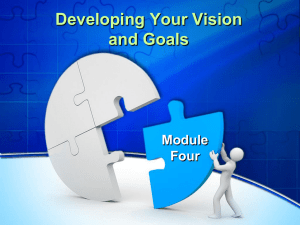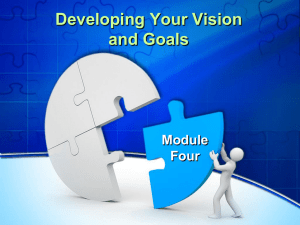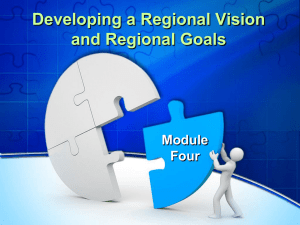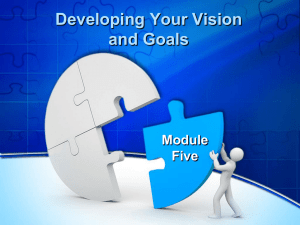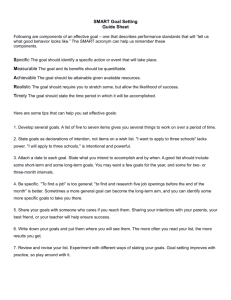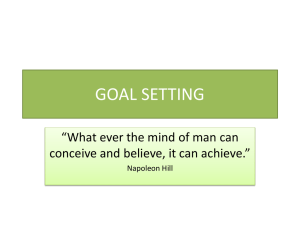Developing Your Vision and Goals Module Four
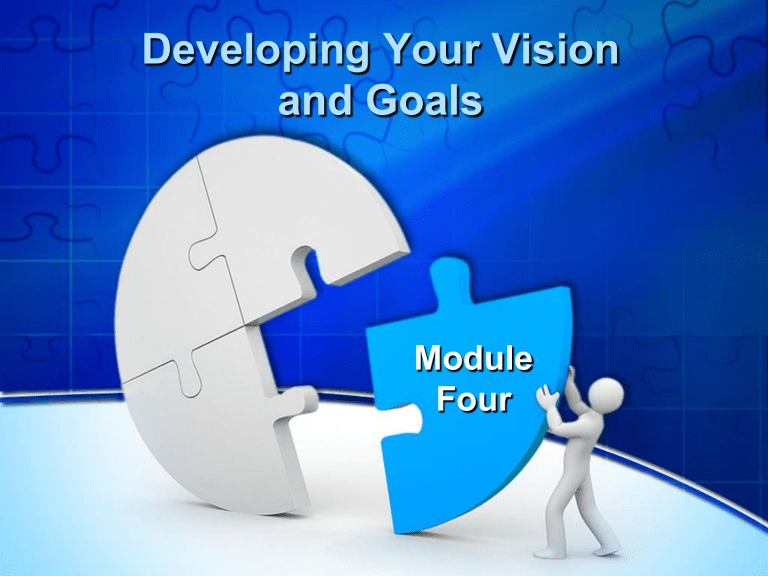
Developing Your Vision and Goals
Module
Four
Something to Think About
Vision without action is a daydream.
Action without vision is a nightmare.
Japanese Proverb
Outline of Module Four
• What’s This Thing Called “Vision”?
• Features of a Strong Regional Vision
Statement
Building a shared vision: A step-by-step process
• What’s a Goal?
SMART Goals
Building an Organizational Goal
•
What’s This Thing Called “Vision”?
Vision is the art of seeing the invisible
Jonathan Swift
• Describes the future situation you want to achieve
• Responds to key questions:
What do you want your region to be?
What are your dreams for the region?
Features of a Strong Vision Statement
Focuses on the future
Relevant for many years
Inspires people, groups, communities
Vision
Statement of a
Regional
Team
Gives shape and direction to the future
Highlights its purpose and values
Source: Killam, D.
(2003)
Building a Shared Vision:
A Step-by-Step Approach
Determine the Focus of Your Vision Statement
Your Regional Team?
Economic Development ?
Quality of Life?
Seek Input on Hopes/Aspirations for the Region
Your Team Key Leaders and Groups Diversity of Residents
Determine Common Themes then Prioritize
Determine which themes to keep Remove ideas less relevant
Draft a Vision Statement from the Key Theme
Share draft with others and seek input
Finalize Your Vision Statement
Source: Mind Tools, LTD (2011)
Examples of Vision Statements
The following are actual statements developed by past SET regions:
West Virginia:
The Western Potomac Economic Partnership will be a magnet for economic growth by attracting new, diverse businesses and investments from around the world. The region’s economy will enjoy a global status that ensures superior job opportunities for residents.
Examples of Vision Statements
New Mexico:
Develop a regionally integrated economy while honoring and protecting natural resources, rural lifestyles, "small town" values, traditions, and culture
Colorado:
The Raton Basin Region is a model of economic prosperity and a healthy rural lifestyle throughout a multi state and diverse cultural area. The Region thrives by cooperatively and collaboratively embracing cultural, economic, educational, technological, and social endeavors.
Group Activity:
Developing a Vision Statement
Steps in Building a Vision Statement
1. Each Person – Reflect on the Following (5 minutes):
What does this region look like in 20-30 years? How and where do people live? What do they do for work? What are your hopes/aspirations for the region?
2. In Small Groups – Share Your Ideas (10 minutes):
Discuss ideas; determine common themes; agree on key ideas/themes most important for your region or for your group’s work
3.
Report Your Small Group’s Key Themes with the
Whole Group (8 minutes):
Identify common themes and opportunities; select most important themes and opportunities
4.
Develop an initial draft of a vision statement (10 minutes) or assign to a Vision Statement Committee:
Use information from Slide 5 as a guide in developing this statement
Source : Adapted from The Power of Appreciative Inquiry 2 nd Edition.
Diana Whitney and Amanda Trosten-Bloom (2010)
THINKING OF OUR DESTINATION:
BEING SMART
!
GENERATING IDEAS
OF POSSIBLE
REGIONAL
GOALS
Let’s Brainstorm Some Ideas
Rules for Brainstorming:
• No ideas are “bad.”
• Don’t get bogged down in detail.
• Consensus is not necessary at this point.
Goals: The Result of Careful Study
Past
History
Workforce
Skills
Regional
Assets
Economic
Strengths
Barriers
Population
Features
Regional Goals
A Goal is. . .
An observable and measurable outcome that you want to achieve within a specific period of time.
S pecific
SMART Goals
• What do you want to achieve?
• Why is this goal important?
• Where will you focus your efforts?
M easurable
• How do you plan to measure progress toward the goal?
• What is the end result, as well as the milestones, you want to achieve along the way? Be concrete.
A ttainable
• Do you have the resources to achieve the goal? (People, organizations, money, physical resources, skills, attitude, etc.)
• Are there factors that might prevent you from achieving these goals?
R elevant • Is this an important enough goal for your region to pursue?
• Is it something that matters (or should matter) to your region?
• Is it something that will bring benefit to your region?
T ime Framed • When do you want to achieve your goal?
• What is the target date for accomplishing your team’s goal ?
Adapted from: Heathfield, S.M. (2011)
SMART Goal Example:
An Example
Specific
Relevant
Increase the survival rate of new business start-ups (less than 5-yearsold) from 50% to 75% in the Big Coast
Region by Dec. 2014
Measurable
Attainable
Time-Framed
17
Developing a SMART Goal
Vague Goals = Vague Results
Prepare a goal that’s crystal clear, concise:
SMART!
WHAT’S YOUR GOAL AS A
REGIONAL ORGANIZATION?
Examples of Organizational Goals by SET Regions
West Central Ohio Network:
• Develop a marketing plan for the West Central Ohio
Network by March 2013 to enable the WCON-area to be recognized as a regional leader in economic development.
North Central New Mexico Development Partnership
• By December 31, 2011, develop a non-profit corporate structure for the organization and complete tax-exempt application with the IRS as an economic development corporation.
Organizational Goal Worksheet
YOUR GOAL: (write your goal in this box and then analyze it using the
SMART criteria below)
Write Your Comments Below
Specific
Measurable
Attainable
Relevant
Time Framed
REVISION OF YOUR GOAL?
Final Reflections
• What did you find most helpful and valuable in this module?
• Are there any items that need to be clarified?
Homework Ideas
• Finalize the Vision Statement
• Ask 2-3 locals for reactions to the vision statement (if it’s completed)
• See if your goal as an organization needs to be finetuned by a sub-committee
• Other items?
What’s Ahead
Module Five:
• We’ll examine a variety of regional economic-related data, such as:
Education
Workforce
Industry
Occupational projections
